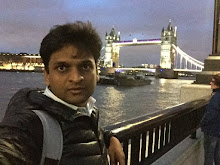A.R.Rahman isn’t new to historical or period films. A.R.Rahman, who always wants to experiment with new sounds, is keen to compose music for such historical movies without any constraints on choice of instruments and sounds, for the sake of authenticity to the period. So, considering ‘Jodhaa Akbar’ being a film set in the Mughal period, if you expect some simple, classically inclined music like that of Naushad’s score for Taj Mahal or Mughal-E-Azam, you are bound to be disappointed or surprised depending upon the openness of your mind.
No matter, whether the lovers are from 18th century or 21st century, the emotions are same and Rahman takes this logic as a token for his freedom to do whatever he wants. He restricts only when it is utmost necessary and otherwise lets his creativity flow infinitely in this soundtrack. But the good thing about Rahman is that even with all liberties, he never goes overboard or weird or make it sound so alien to the movie’s setup to prove his experimentation skills. The songs are an eclectic mix of Javed Akthar's beautiful poetry, contemporary sounds, traditional instruments, classical melodies and western classical orchestration.
“Azeem-O-Shahenshah” is a majestic song with every beat and its thump singing the praise of the shahenshah and comes out proving that Rahman is the real Shahenshah when it comes to matching the visual grandeur with his music. The solo horn piece, majestic lines, the soulful chorus, varied percussions, and extremely catchy phrases of melody, and above all the sound of Rahman that it creates when all those elements come together makes this an instantly likeable track.
“Jashn-E-Bahaara” is a breezy romantic melody without much of complexities in its structure like other songs. The simple melody with Javed Ali’s velvety rendition sounds heavenly. There are not too many layers of instruments running in the background and the melody just unfolds with effective chords and instrument sounds are just sprinkled into the song to create a pleasant ambience around the melody.
“In Lamhon ke daaman” is highly unpredictable and goes through a lot of variations. It alternates between a soothing melody and an alluring crescendo of chorus and the transition is effectively seamless and gives us a lot of goose-bump moments in the song. Especially when it returns to the main melody after a high decibel crescendo, the feeling you get cannot be expressed in words. The melody sounds serene on divine vocals of Sonu nigam. The strains of Santoor and Sitar sprinkled throughout the track tries to keep the song grounded to the sound of period and its musical tradition.
“Khwaja Mere Khwaja” is another typical Rahman’s catchy qawwali number with indispensable multi layered vocals, bass lines, Tabla and additional fresh rhythm layers. It takes sometime for the flow of the melody to sink in but it sure does after 2 or 3 listening. Rahman’s rendition is little different and tends to be more spiritual.
“Mann Mohana” though starts like a typical bhajan, gets richer in orchestration in the interludes and flute flourishes adds a mystic flavour to the song. The song sounds really too long, tedious and boring on first listening, but once we get acquainted with the turns in the phrases of the melody, it is likeable.
The instrumentals are not the usual ones we get to hear in every other soundtrack. It seems that Rahman has taken a lot care to make us hear the instrumentals, without skipping it. Navin’s flute traverses those extra octaves which we don’t hear in the vocal version. And to avoid being repetitive, the first part of the song is played on a huskier bass flute and the second part is performed with a saccharine high pitched flute. Even if this track comes immediately after the vocal version, you won’t feel like skipping it.
No one could have thought of a song like ‘Khwaja mere Khwaja’ being performed with a western classical orchestra. With Harp replacing the Tabla rhythm and strings adding an emotional depth, Oboe dominates the song playing the lead melody. The instrumental of ‘Khwaja Mere Khwaja’ is just an out of the world idea and composition.
So the final verdict is that Jodhaa Akbar music is not a wannabe classic, its gonnabe a classic.
PS: If you are a diehard Lagaan fan, you may also be interested in reading ’Listening Lagaan’.
1.19.2008
Jodhaa Akbar Soundtrack
Posted by P.S. Suresh Kumar at 4:00 PM 16 comments
Labels: A.R.Rahman, Aishwarya Rai, Asutosh Gowariker, Hrithik Roshan, Javed Akthar, Jodhaa Akbar Music Review, Jodhaa Akbar Songs, Jodhaa Akbar Soundtrack
1.18.2008
Listening Lagaan
This is something I have been thinking to write for more than one year. And finally I found time and patience to write it. An analysis on Rahman's background score for Lagaan (with 40 BGM clips).
Posted by P.S. Suresh Kumar at 2:46 PM 1 comments
Labels: A.R.Rahman, Background Score, BGM Clips, Lagaan
1.08.2008
Jodha Akbhar Songs
The official audio release of eagerly awaited 'Jodhaa Akbar' is scheduled for tomorrow. While the audio release has been postponed so many times, it seems that it would finally hit the market within this week. Two of the songs are already out on FM and expectedly both the songs are very good. Listen Jashan-e-bahaara and Azeem-o-shahenshah
Posted by P.S. Suresh Kumar at 1:41 PM 5 comments
Labels: A.R.Rahman, Asutosh Gowariker, Jodhaa Akbar Songs
1.01.2008
New Year 2008
Wish you all a Peaceful and Musical New Year
Posted by P.S. Suresh Kumar at 11:41 AM 1 comments


